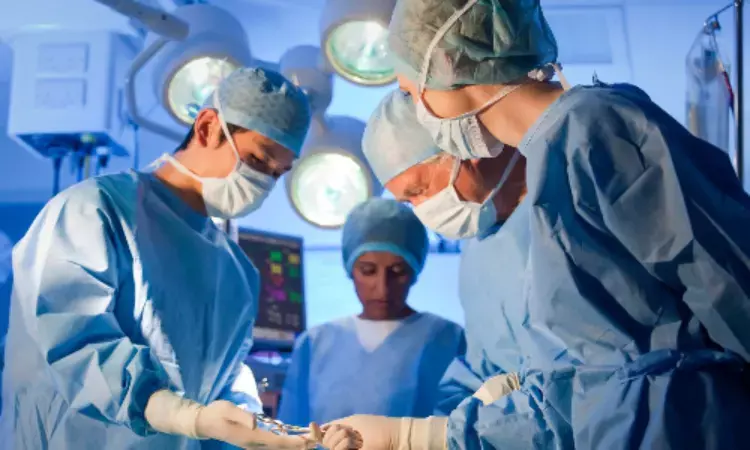- Home
- Medical news & Guidelines
- Anesthesiology
- Cardiology and CTVS
- Critical Care
- Dentistry
- Dermatology
- Diabetes and Endocrinology
- ENT
- Gastroenterology
- Medicine
- Nephrology
- Neurology
- Obstretics-Gynaecology
- Oncology
- Ophthalmology
- Orthopaedics
- Pediatrics-Neonatology
- Psychiatry
- Pulmonology
- Radiology
- Surgery
- Urology
- Laboratory Medicine
- Diet
- Nursing
- Paramedical
- Physiotherapy
- Health news
- Fact Check
- Bone Health Fact Check
- Brain Health Fact Check
- Cancer Related Fact Check
- Child Care Fact Check
- Dental and oral health fact check
- Diabetes and metabolic health fact check
- Diet and Nutrition Fact Check
- Eye and ENT Care Fact Check
- Fitness fact check
- Gut health fact check
- Heart health fact check
- Kidney health fact check
- Medical education fact check
- Men's health fact check
- Respiratory fact check
- Skin and hair care fact check
- Vaccine and Immunization fact check
- Women's health fact check
- AYUSH
- State News
- Andaman and Nicobar Islands
- Andhra Pradesh
- Arunachal Pradesh
- Assam
- Bihar
- Chandigarh
- Chattisgarh
- Dadra and Nagar Haveli
- Daman and Diu
- Delhi
- Goa
- Gujarat
- Haryana
- Himachal Pradesh
- Jammu & Kashmir
- Jharkhand
- Karnataka
- Kerala
- Ladakh
- Lakshadweep
- Madhya Pradesh
- Maharashtra
- Manipur
- Meghalaya
- Mizoram
- Nagaland
- Odisha
- Puducherry
- Punjab
- Rajasthan
- Sikkim
- Tamil Nadu
- Telangana
- Tripura
- Uttar Pradesh
- Uttrakhand
- West Bengal
- Medical Education
- Industry
Bariatric surgery linked to vitamin D and ferritin deficiencies in adolescents

Iran: A meta-analysis published in Obesity Surgery showed an increase in the serum ferritin level following bariatric surgery in adolescents. After the surgery, vitamin D and ferritin deficiencies were estimated to be present in more than one-third of adolescents.
"Serum ferritin increased by 21 mcg/L after bariatric surgery in adolescents," the researchers reported. "Deficiencies of ferritin, albumin, vitamin B12, vitamin D, iron, and calcium after bariatric surgery were estimated to be 9-49% in adolescents."
The systematic review and meta-analysis study was conducted by Faraneh Zolfaghari, Shahid Beheshti University of Medical Sciences, Tehran, Iran, and colleagues to estimate changes in blood nutrient concentrations and nutrient deficiencies in adolescents following bariatric surgery.
For this purpose, the researchers searched online databases to find studies published between 2000 and 2023. They selected observational studies reporting the mean blood concentration of nutrients before and after bariatric surgery or the proportion of nutrient deficiencies after the surgery in healthy adolescents. A total of fifteen studies were included.
Based on the study, the researchers reported the following findings:
- Gastric bypass and sleeve gastrostomy were the most common types of surgery.
- Vitamin D, iron, ferritin, vitamin B12, calcium, and folic acid were the most studied nutrients, respectively.
- Other nutrients examined in the studies included zinc, phosphorus, and albumin.
- The serum ferritin increased by 21 mcg/L (95% CI = 10.0, 32.0 mcg/L) after the surgery, but there were no significant alterations in other nutrients.
- The postoperative prevalence of low albumin, ferritin, vitamin D, and vitamin B12 levels was 10%, 49%, 41%, and 20%, respectively.
- 23% had an iron deficiency, and 10% had a calcium deficiency after bariatric surgery.
The findings revealed an increase in serum ferritin levels following bariatric surgery in adolescents. Ferritin and vitamin D deficiencies were estimated to be present in more than one-third of adolescents after the surgery.
"Our findings highlight the need for correcting and assessing adolescents' nutritional status before and after bariatric surgery to reduce nutritional deficiencies after the surgery," they concluded.
Reference:
Zolfaghari, F., Khorshidi, Y., Moslehi, N. et al. Nutrient Deficiency After Bariatric Surgery in Adolescents: A Systematic Review and Meta-Analysis. OBES SURG (2023). https://doi.org/10.1007/s11695-023-06955-y
Dr Kamal Kant Kohli-MBBS, DTCD- a chest specialist with more than 30 years of practice and a flair for writing clinical articles, Dr Kamal Kant Kohli joined Medical Dialogues as a Chief Editor of Medical News. Besides writing articles, as an editor, he proofreads and verifies all the medical content published on Medical Dialogues including those coming from journals, studies,medical conferences,guidelines etc. Email: drkohli@medicaldialogues.in. Contact no. 011-43720751


